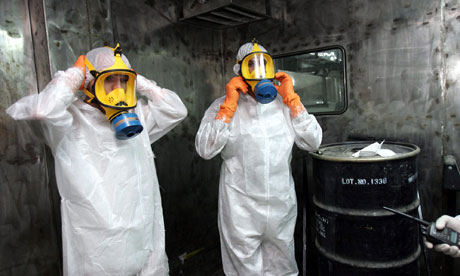UPDATES
Sudden jump in odds on Iran attack
November 3, 2011 | Daniel Meyerowitz-Katz

A whole series of events last night made an attack on Iran’s nuclear facilities suddenly seem far closer than had previously been the case. After a week of speculation in the Israeli press, Haaretz reported yesterday that the Prime Minister and Defence Minister are trying to gain cabinet support for a strike.
Prime Minister Benjamin Netanyahu and Defense Minister Ehud Barak are trying to muster a majority in the cabinet in favor of military action against Iran, a senior Israeli official has said. According to the official, there is a “small advantage” in the cabinet for the opponents of such an attack.
Netanyahu and Barak recently persuaded Foreign Minister Avigdor Lieberman, who previously objected to attacking Iran, to support such a move.
This report coincided with the test-firing of a new long-range Israeli missile, which could be capable of reaching targets in Iran.
JERUSALEM – Israel tested what experts said was a long-range ballistic missile on Wednesday morning, firing it out to sea from an Air Force base just south of Tel Aviv and causing jittery Israelis who saw the launch on their way to work to jam emergency lines.
… The Ministry of Defense would not specify what kind of missile was being tested. It issued a laconic statement saying only that Israel had test fired a rocket propulsion system, and that the test had been planned “a long time ago and was carried out as scheduled.”
… Yiftah Shapir, an expert in non-conventional weapons at the Institute for National Security Studies at Tel Aviv University, said he believed that Israel had most probably test-fired a new satellite launcher, which would basically employ the same technology as a ballistic missile with a range of thousands of miles.
The news comes as Iranian-made rockets recently smuggled into the hands of terror group Palestinian Islamic Jihad in Gaza have been reaking havoc in Southern Israeli towns, terrorising local civilians and keeping children from going to school.
[A]n Ashkelon man, Moshe Ami, a father of four, was killed in a rocket attack on his way home. The air raid siren, which gives Ashkelon residents about 25 seconds to find cover, went off as Ami was driving home in the heart of the city along Rabin Road. Unable to make it to the shelter in time, a piece of shrapnel from the rocket explosion mortally struck Ami and he later died of his wounds in Ashkelon’s Barzilai Medical Center.
In addition to Ashkelon, a city of over 120,000, the barrage of Grad missiles also struck Be’er Sheva, Ofakim, and Ashdod, considered major metropolitan areas of Israel’s south. The rockets hit an Ashdod school and caused extensive damage to countless buildings and homes in residential neighborhoods across the region. Twenty Israelis were hospitalized for shock and injury including a baby.
A total of 35 projectiles including Iranian-made Grads and mortar shells struck Israel this past Saturday … Ashkelon’s mayor Benny Vaknin said on Sunday that the type of missiles fired on Saturday caused much greater destruction than past rockets.
… Vaknin refused to allow Ashkelon students to attend schools on Monday, for the second day in a row … Most of Ashkelon’s schools are not protected against rocket attacks. The city has close to 30,000 students in its education system including 6,000 college students at Ashkelon’s Academic College.
The biggest news with regard to an attack on Iran, however, comes not from within Israel, but the UK. The Guardian has reported that British forces are making plans in preparation for this eventuality.
Britain’s armed forces are stepping up their contingency planning for potential military action against Iran amid mounting concern about Tehran’s nuclear enrichment programme, the Guardian has learned.
The Ministry of Defence believes the US may decide to fast-forward plans for targeted missile strikes at some key Iranian facilities. British officials say that if Washington presses ahead it will seek, and receive, UK military help for any mission, despite some deep reservations within the coalition government.
In anticipation of a potential attack, British military planners are examining where best to deploy Royal Navy ships and submarines equipped with Tomahawk cruise missiles over the coming months as part of what would be an air and sea campaign.
Interestingly, Israeli Defence Minister Ehud Barak is currently meeting with British government officials in London.
Meanwhile in the US, Congress has passed yet another round of sanctions on Iran, this time targeting Iran’s central bank. The ever-harsher sanctions, however, do not seem to be significantly impeding the Islamic Republic’s efforts at nuclear armament, meaning that the question of a military strike is becoming ever more pressing. That said, as the editorial in the Guardian starkly explains, this option could have terrible repercussions and should remain a last resort only.
The regional consequences of an aerial strike are daunting. It would be not one strike but many, with unforeseeable consequences. Heavy civilian casualties and an Iran reunited around its leadership are just two. Ground troops might well be needed to keep the Straits of Hormuz open. This would be war. Nor would it be one but potentially several, as missiles rained down on Israel from Lebanon and Gaza and Iran retaliated on targets in Iraq. Further, if the Iranian intention to construct a nuclear bomb was covert before such an attack, it would surely be overt after it.
Daniel Meyerowitz-Katz
Tags: Iran





